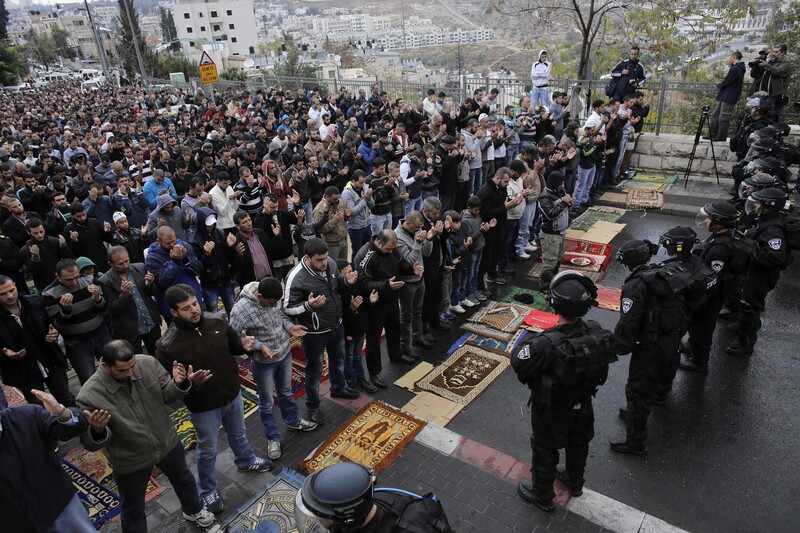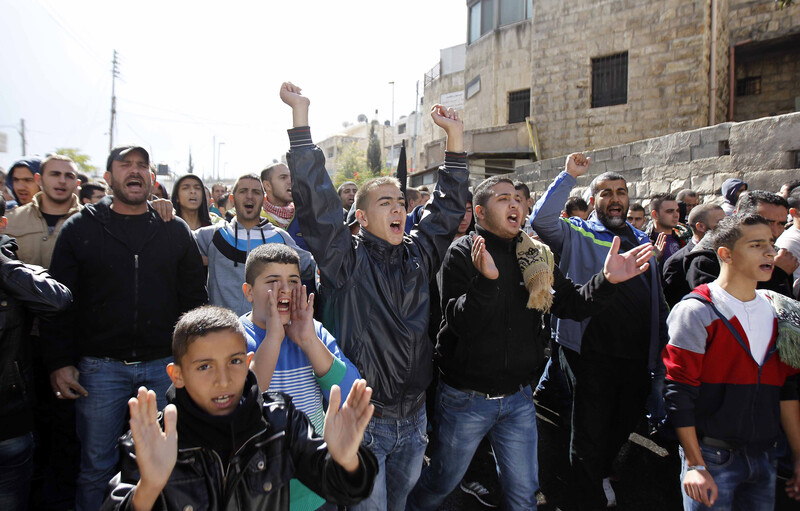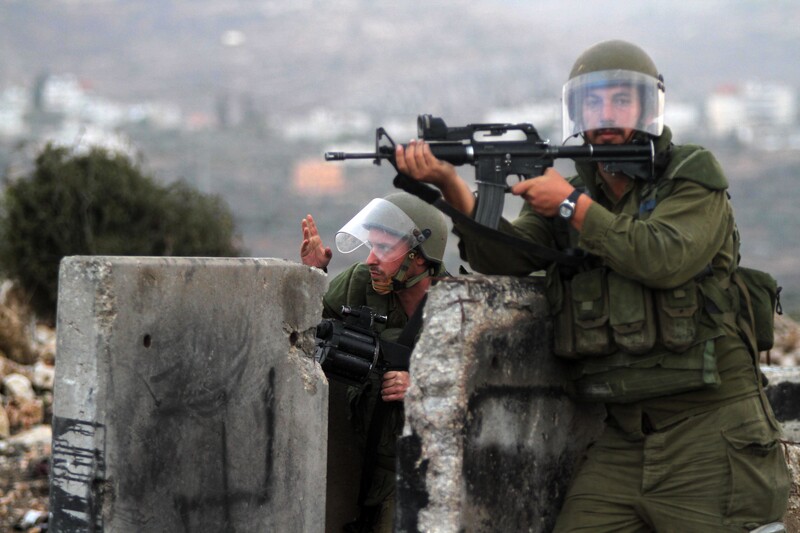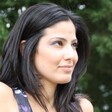The Electronic Intifada Podcast 2 November 2014
“The message the Israelis are sending is that Jerusalem Palestinians are unwanted here and they are doing everything to reassert their control and squash any form of dissent and resistance to Israeli policies of ethnic cleansing in Jerusalem,” Twitter user @BDS4Justice, or Zalameh, told The Electronic Intifada from his home in the eastern occupied Jerusalem neighborhood of Shuafat on 29 October.
A few hours after our conversation, Israel intensified its crackdown in eastern occupied Jerusalem following an assassination attempt on prominent rightwing extremist Yehuda Glick, a Temple Mount agitator who seeks to replace the al-Aqsa mosque with a Jewish Third Temple, a goal Zalameh says is “mainstream” in the Israeli government.
“[Temple Mount settlers] have enjoyed official support by the Israeli army and they enter Aqsa on a daily basis in large numbers as an act of provocation,” explained Zalameh, adding that the media have largely ignored months of peaceful Palestinian protests against Israeli restrictions and encroachment on al-Aqsa.
Meanwhile, he says the racism in Jerusalem from Israelis continues to escalate. But unlike during the summertime, when mobs of Jewish extremists were hunting and attacking Palestinians in the street, it is the Israeli “security” apparatus that is now doing the harassing on behalf of the Israeli government.
In Zalameh’s own neighborhood, Shuafat — which been under siege by Israeli police since Jewish settlers kidnapped and burned alive his neighbor, sixteen-year-old Muhammad Abu Khudair, in early June — the police repression is suffocating.
For the last four months Israeli forces have “punish[ed] the population for reacting to [Abu Khudair’s] gruesome murder,” waging “the largest arrest campaign since the second intifada,” said Zalameh, who has been forced to endure an Israeli army post stationed right outside his home.
“Several of my neighbors were taken in the middle of the night, were interrogated, placed in administrative detention, accused falsely of things they didn’t do,” Zalameh said.

Israeli occupation forces blocked Palestinian worshipers from accessing al-Aqsa mosque in the Old City of Jeruslem on Friday.
APA imagesMore recently, Israel has used fatal Jerusalem car crash at the Jerusalem light rail last week as a pretext to ramp up its campaign of harassment, flooding Palestinian neighborhoods in the occupied city with tear gas, drones, low-flying helicopters and more police. “[Y]ou cannot drive for more than two minutes without seeing an Israeli patrol,” said Zalameh, describing a police state.
This comes on top of the ongoing daily harassment, house demolitions, ethnic cleansing and settlement expansion — official Israeli policies that seek to gradually weaken the Palestinian presence in Jerusalem “to the point that whatever [Israelis] do to al-Aqsa and the Old City will be met with little resistance,” said Zalameh.
Nevertheless Jerusalem Palestinians, particularly the youth, are pushing back with what little they have and in a way that Palestinians in the West Bank cannot due to the repressive Palestinian Authority, which Zalameh described as “a buffer to any form of resistance to Israel.”
“This is really a struggle for survival,” Zalameh proclaimed, adding that while Palestinians have a moral duty to resist, “it’s also a moral duty for those in solidarity with Palestinians abroad to intensify their efforts for boycott, divestment and sanctions to support the struggle here in Jerusalem.”
Listen to the interview using the media player above, or read the transcript below (which has been edited for clarity).
Transcript
Rania Khalek: You live in the Shuafat neighborhood in East Jerusalem. Right now things from over here seem crazy. Tell us what’s happening around you with the police.
Zalameh: Since the Israeli settlers kidnapped and murdered by burning alive my neighbor Muhammad Abu Khudair, sixteen years old, this summer, the repression on my neighborhood Shuafat and Jerusalem as a whole has been really strong.
It was a case where the Israeli settler not only killed but Israeli state forces, the military, are now punishing the population for reacting to the gruesome murder.
At the same time if you look at the court procedures, everything is being done by the settlers who committed the crime but the victims are once again being punished.
During the summer until now, the Israeli government has conducted the largest arrest campaign since the second intifada. Several of my neighbors were taken in the middle of the night, were interrogated, placed in administrative detention, accused falsely of things they didn’t do. Just generally it’s not safe for anyone. There’s really been harassment on a daily basis. For someone like me for example, there is an Israeli army post right outside my home so every time I open the door of my home I have five armed Israeli soldiers in a car with big light sirens parked right outside. In addition over me regularly we have drones flying.
In the last week and a half we have had for hours on end helicopters flying low in my neighborhood.
The message the Israelis are sending is that Jerusalem Palestinians are unwanted here and they are doing everything to reassert their control and squash any form of dissent and resistance to Israeli policies of ethnic cleansing in Jerusalem.

Palestinians in Jerusalem protested Israeli restrictions on their freedom of movement on Friday.
APA imagesRK: You mentioned the police outside. I know Shuafat, since Muhammad Abu Khudair was killed, has been under intense police occupation. But it seems to have gotten more intense in the past week since this Jerusalem driver rammed into the light rail. Can you talk a little bit about what is happening? I’m seeing reports about tear gas canisters being thrown into people’s windows and traffic tickets being enforced more harshly. Are you noticing this? Is this a ramping up of what’s been happening over the past couple of months?
Z: As an avid driver in Jerusalem I can tell you that you cannot drive for more than two minutes without seeing an Israeli patrol. Their presence is very, very visible and it has significantly increased. But the trigger was not the Palestinian driver who ran into the train passengers. The tensions were already high and it was connected to the Israeli policies to change the status of the al-Aqsa mosque.
In particular during the period of the Jewish high holidays that started from Rosh Hashanah and ended with the Sukkot holiday, what the Israeli army has attempted to do is to close the al-Aqsa mosque for the Palestinian Muslim worshipers and have the mosque open for extremist Jewish zealots to enter the mosque and have the mosque exclusively for themselves.
At the same time Israeli settler groups have become also more vocal in calling for the Israeli army to take over the mosque. And this created a lot of tension because the Palestinians want to defend the mosque from the attack.
The settlers have a clear agenda that they want to destroy the mosque and build a temple over it. And this is becoming a very mainstream call, not only a fringe call, which includes also officials from within the Knesset and from within parties which are part of the government. They have enjoyed official support by the Israeli army and they enter al-Aqsa on a daily basis in large numbers as an act of provocation.
As a result Palestinian access to the mosque has been more and more restricted and it has led to widespread protests by all Palestinians in Jerusalem and the tensions were high as a result of that in addition to what had already happened during the summer.
The anti-Arab discourse in Jerusalem of bigotry and hate has really escalated on the Israeli side. Palestinians are feeling threatened. And obviously the policies of ethnic cleansing, house demolitions, the daily harassment that every single Palestinian has to face in this city just to survive is bringing also this unity and the need to step up protests against the Israeli occupation in Jerusalem and defend al-Aqsa and defend Jerusalem against the Israeli encroachment.
RK: You mention the anti-Arab harassment. People have told me they don’t feel safe walking by themselves outside. Is that the case for you?
Z: There was a moment in the summer when it was the case in the sense that a lot of mobs were gathering in the streets and there was a lot of stories that people who were going in the streets of Jerusalem were being harassed, so there was adding to this sense of insecurity. I agree, I do feel insecure going in the streets but now it’s that the Israeli government, the army, has stepped up and they are doing the harassment.
At one point you would see those mobs especially around the burning of Muhammad Abu Khudair. You would see a lot of citizen mobs trying to attack Palestinians. But the Israeli army are really representing the mood in Israeli society and they are doing this harassment.
It’s correct that you said cars are being stopped, flying checkpoints, they’re trying to check also people’s taxation as a means to displace people from Jerusalem, their status in the city. There are all sorts of forms of sanctions against Palestinians and punishments against Palestinians to try and silence Palestinians from this ongoing harassment.
I would add also that in Shuafat, the Jerusalem light rail that passes through Shuafat is connecting the settlements in East Jerusalem to and integrate them to West Jerusalem, has been an excuse for the Israeli army to completely militarize this area with the drones and so forth. You know that there is an international BDS [boycott, divestment and sanctions] campaign against Veolia and Alstom, two French companies, that built that light railway and now this is really the concrete example of how this was indeed part of the Israeli plans to annex East Jerusalem and Veolia at the time had commissioned an opinion poll saying Palestinians were happy with the light rail. In fact that’s completely the opposite.
Israelis now in effect have prohibited Palestinians from riding on the train. In particular in Shuafat you can no longer enter in the train from here because you cannot purchase a ticket. So it became really a Jewish-only mode of transportation with really really minor exceptions. For the excuse of protecting the settlers riding it, there are police military outposts every few meters along Shuafat’s main road.
RK: You mentioned that this is not because of the Jerusalem driver who hit the pedestrians last week. So that was basically a pretext for what’s happening now?
Z: Yes. This definitely was not a result. The Jerusalem accident, maybe it was a culmination and expression of Palestinian protests. For weeks I was actually tweeting there has been all sorts of Palestinian nonviolent protests that are happening in Jerusalem, the tensions are high, but not a single headline in the media, no one is really paying attention. Really for the first time that actually people paid attention was when this accident happened here in Jerusalem.
So that was not really the precursor to anything. The repression was happening with the Jewish High Holidays and Israel used the holidays to advance an attack on the al-Aqsa mosque.
RK: That’s depressing and disturbing to use religious holidays to do that. With the al-Aqsa mosque, these provocations have been taking place for weeks and I’ve seen you tweeting about how no one’s paying attention to these protests that are taking place and people were being brutalized and tear gassed. I’m a little bit confused about what Israel is saying they want to do with al-Aqsa. They want to partition it? What’s happening with Israel’s plans and what’s the significance of that with the al-Aqsa mosque?
Z: The intermediate step that is clearly being developed, and this started in 2013 in the High Holidays last year, for the very first time is an attempt to partition.
You’ve seen Israel doing this already in the case of Hebron, which also has a mosque belonging to Palestinians. They used the pretext of the massacre that Baruch Goldstein committed in [1994] to go ahead and partition the mosque, which now is de facto partitioned. They want to apply the Hebron model to Jerusalem and do the same. But the Israelis have done so in a progressive way.
Since 1967 the status quo has been that the mosque will remain as a mosque. Slowly though they are undermining their own commitment and there will even be a Knesset [Israeli parliament] bill to challenge the status quo in relation to al-Aqsa and they have sponsored these incursions of violent settlers into al-Aqsa on a daily basis with armed guard and obviously Palestinians do protest that and they heavily repress and arrest. The intermediate plan really is that.
In the long-term what I foresee is what Israel is doing is weakening Palestinian presence in Jerusalem through house demolitions, ID card revocations, banishment and expulsions from the city. Every year hundreds are prohibited from entering the city even though their families are from here, they were born here, Israel revokes their IDs, and gradually Judaizing Jerusalem to the point that whatever they will do to al-Aqsa and the Old City will be met with little resistance because Palestinians presence here is becoming weaker and weaker.
If you look at the amount of resistance to equivalent acts of Israel now just ten years ago or just during the second intifada when Sharon visited al-Aqsa Palestinians were stronger at the time in Jerusalem, they could mount a more credible resistance. So [Israel’s] strategy is really gradual.
So now they’re going for partition and maybe later, they already have the plans for the Temple. I’m not even being conspiratorial here. This is something that enjoys broad endorsement.

Israeli occupation forces in Silwad, near Ramallah, on Friday fired at Palestinians protesting against the Israeli takeover of al-Aqsa mosque compound.
APA imagesRK: You’re talking about how religious fanatics want to tear down the mosque and rebuild a temple there, right?
Z: Yes, but I wouldn’t call them religious fanatics because this is an idea within the mainstream of Israeli society. It just hasn’t been implemented because the right political opportunity hasn’t taken place. But we know from experience in other cases of Israel, whenever there is a right moment, they will do it. We never imagined there would be a blockade of Gaza. Today we have it.
But it’s becoming mainstream and those people who are leading the movement are in the Knesset. One of them is [deputy speaker] Moshe Feiglin from the Knesset. Those are people who enjoy broad support in Israeli society.
RK: In terms of what’s happening on the ground now, there is an effort to push back. So people are throwing fireworks back at police, at least in some cases. And they’re throwing rocks. They’re throwing whatever they can. I want to get your take on some people who like to finger-wag at any kind of throwing of rocks, they call it violence, any sort of property destruction mounted by the people who are being oppressed. How do you respond to those kinds of people?
Z: If you look at the extent of Israeli policies in Jerusalem, which are well-documented and amount to ethnic cleansing and apartheid, you would see that the crime are those Israeli policies. And what you see the youth reacting to whatever little they have, it’s a reaction to that bigger injustice. The context of Jerusalem, which is often missing within the media reports, is really really important.
It’s to understand that Israel admittedly, within Israeli-Jerusalem municipality plans they say they want to maintain “the demographic balance” in Jerusalem, which means they want a Jewish majority in Jerusalem of at least seventy percent, which means erasing Palestinians from the city. This is really a struggle for survival. And when you’re struggling for survival in the city, in your capital, you would use whatever little you have. But compared to what Israel is doing as the oppressor, I think that’s the crucial context that is often missing in these baseless accusations. And because Israel is not being held to account for its actions, it obviously feels emboldened to continue doing so.
Palestinians indeed, it’s a moral duty for resistance, but it’s also a moral duty for those in solidarity with Palestinians abroad to intensify their efforts for boycott, divestment and sanctions as well as a way to support the struggle here in Jerusalem. And I’d say Veolia, for example, it’s a key target of the movement that really needs to pay the cost for its support for Israeli illegal annexation of East Jerusalem through investments and profit making in the city.
RK: [Palestinian Authority leader] Mahmoud Abbas doesn’t have the kind of control over East Jerusalem that he has in the West Bank. Do you think his lack of control in East Jerusalem is the reason people are able to push back and protest?
Z: As someone who regularly moves between these two spaces, Ramallah and Jerusalem — Ramallah being under the Palestinian Authority and Jerusalem directly under Israeli control — really the PA has been a buffer to any form of resistance to Israel.
Someone who’s living in Ramallah maybe wouldn’t come across an Israeli soldier as often as you would have to on a daily basis here, basically in your face in Jerusalem.
In terms of analysis, in terms of mindset and a sense of identity, [in] Jerusalem there are no filters. You are seeing it as it is and your oppressor is literally in front of you every day, whereas the PA is sort of a filter. So the fact that the PA is not in Jerusalem, it sort of helped bring the struggle into the streets, something which is not fully happening inside the cities of the West Bank, which is slightly more difficult.
RK: Where do you see all this going? It seems as though things are going to explode and very soon. There’s so much tension and all these provocations happening.
Z: Israel is really touching into the heart of the wound, which is the al-Aqsa mosque. You don’t need to be Muslim to identify with how important the Old City area is for Palestinians broadly. This really has potential to bring Palestinians together. It’s not the first time where al-Aqsa and the Old City unified Palestinians. Jerusalem unifies Palestinians’ imaginations of a free Palestine. So whatever Israel is doing in Jerusalem has the potential to reverberate across the West Bank, Gaza, in ’48 areas [in present-day Israel] as well.
You did see this already during the summer when the tensions were already high in Jerusalem that villages, which are now inside Israel, Umm al-Fahm, Nazareth, Palestinians inside Israel and the West Bank, they rose up in protests.
So this does have potential to unify the currently fragmented Palestinian body politic. If there is something that can unify Palestinians, that would be Jerusalem.






Comments
How is that "Truce" working
Permalink Susan replied on
How is that "Truce" working out?
Palestinian leaderships are Israeli’s agents!
Permalink Unes replied on
Palestinian leaderships are Israeli’s agents!
Hamas complains Israelis blockade of Gaze is hurting the Palestinians in Gaze. To confront Israeli’s blockade Hamas has put great efforts smuggling worthless missiles to fight Israelis! Such conduct not only has caused great suffrage for the Palestinians in Gaze, but it has given credence to the Israelis’ claim that the blockade is for blocking Hamas from arming themselves and jeopardizing Israelis’ security! The firing of those useless missiles has given excuses for the Israelis to destroy Palestinians livelihoods brutally many times. Instead of smuggling those useless missiles, if Hamas had smuggled some equipment for peaceful development and improving the living condition of the Palestinian people in Gaze, wouldn’t that had discredited the Israelis’ claim for the blockade!? Hamas actions cannot be characterized just stupid, but it rather is betrayal of the Palestinians causes and for the benefit of the Israelis, and nobody can be that stupid. This proves that Hamas leader has to be an agent of the Israelis, who is betraying the interests of his own people in favor of the Israelis.
On West Bank President Abbas’s starting position for negotiating with Israelis is swapping their good lands in the heart of the West Bank with some no good land in Israel! Why do the Palestinians ever want to accept such ridiculous swap!? The International Law says that they should get all of the West Bank according to 1967 border. When the Israelis are seeing such stupidity and willing betrayer as the head of the Palestinians’ negotiator, then naturally they want to continue with current situation; the longer they continue with this current situation the more good land they will own! This proves that President Abbas has to be an agent of the Israelis, who is betraying the interests of his own people in favor of the Israelis.
May God Bless Us All,
Unes